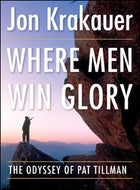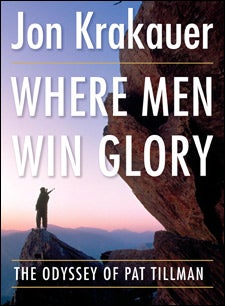THE STORY of Pat Tillman, the NFL star who walked away from gridiron fortune to fight for his country in Afghanistan, doesn’t at first glance seem to be Jon Krakauer material. A nonfiction master who cut his teeth at ���ϳԹ���, Krakauer wrote the classics Into the Wild and Into Thin Air, which chronicled the courage, existential yearning, and occasional foolishness of civilians who tested themselves, respectively, in the Alaskan wilderness and on the world’s highest mountain. Football players and war heroes would not seem to be his bag.
Oil Habits Die Hard
Global warming, peak oil, the energy crisis: This month three writers examine how we got into this fixand how to get out of it.In Power Trip: From Oil Wells to Solar CellsOur Ride to the Renewable Future
(HarperCollins, ), ���ϳԹ���’s former Code Green columnist Amanda Little maps America’s energy landscape, traveling to deep-sea oil rigs, NASCAR speedways, Google’s 21st-century campus, and the Pentagon’s DefCon-haunted warrens. Her findings: American ingenuity created cheap fossil fuel, and that same ingenuity is spurring monumental change. If you think the fossil-fuel dinosaurs will fade without a fight, though, Peter Maass’s
Crude World: The Violent Twilight of Oil
(Knopf, ) will set you straight. The ���ϳԹ��� contributi…
Where Men Win Glory
 Where Men Win Glory
Where Men Win GloryBut the fallen man at the heart of Where Men Win Glory: The Odyssey of Pat Tillman (Doubleday, $28) quickly emerges as a classic Krakauer character.
The cover-up of Tillman’s death by friendly fire is by now one of the better-known acts of shame in the war on terror, but Krakauer lays down a fresh indictment of both the Bush administration and the U.S. Army. In April 2004, a U.S. Ranger caught in a canyon in Afghanistan shot Tillman, who was waving down to his comrades from a cliff above, signaling he had them covered. Tillman’s regiment concealed this fact in order to soften the blow to his brother, Kevin, who served in the same platoon; the Bush administration, reeling from bad press, continued the cover-up. Backed by years of research and thousands of pages of documents, Krakauer lays out a devastating case that shows how, in his words, “the 75th Ranger Regiment engaged in an elaborate conspiracy to deliberately mislead the family.”
Where Men Win Glory will stand as one of the signal books of the wars in Iraq and Afghanistan, a grunt’s-eye view to complement the macroscopic work of Dexter Filkins, Thomas E. Ricks, and George Packer. If there’s a complaint here, it’s that the author seems to rein in his own critical voice. Krakauer’s willingness to probe the motives of his subjects is what sets his work apart. His insights into a young man’s search for meaning gave Into the Wild unparalleled depth. In Under the Banner of Heaven, he explored the world of Mormon extremists and grappled with religion itself. In Tillman he has a man who at times can appear a gallant fool naively pursuing virtue. In the soldier’s journals, excerpted in the book, Tillman wrestles with the justness of the Iraq war but doesn’t question his duty to carry it out. You expect Krakauer to dig in here, but instead of tackling the essential questionIs a patriot’s duty to shut up and fight or question a reckless war?the author adopts the safer tactic of defending Tillman as a rare man of passion in a corrupt world. “The sad end he met in Afghanistan was more accurately a function of his stubborn idealismhis insistence on trying to do the right thing,” writes Krakauer. “In which case it wasn’t a tragic flaw that brought Tillman down, but a tragic virtue.”
The highly anticipated book’s publication was delayed last year when Krakauer said he was unhappy with the manuscript. In the end, he does pull some punches. No matter. The hero treatment Tillman receives can’t quite diminish the power of this fiercely reported story of a good man whose honor and sacrifice were abused by those under whom he served.


